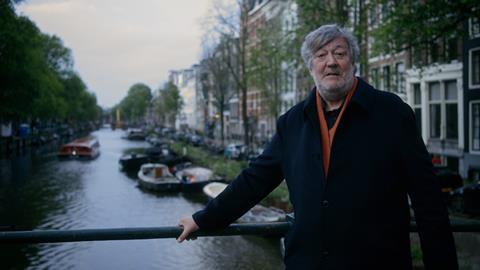“It is a moving story, and one which deserved this prime-time airing”

Willem and Frieda: Defying the Nazis, Channel 4
“Presenting Willem and Frieda: Defying the Nazis, the remarkable story of a gay man and a lesbian who helped to save thousands of lives in the Netherlands during the Second World War, felt like a personal mission for Stephen Fry, who is gay and Jewish. He was astonished, rightly, that there are no streets or schools named after Willem; most people have never even heard of him. How can that be of a hero who literally died for other people, the purest altruism?”
Carol Midgley, The Times
“It is a moving story, and one which deserved this prime-time airing.”
Anita Singh, The Telegraph
“Stephen Fry brings more than erudition to the archive table. These are the visceral reactions of someone with a personal connection to the history, not a jobbing presenter on another indifferent gig. In Fry’s telling, the story of Willem and Jan the market gardener from Apeldoorn is revealed as the great tragic romance it always was. When no illustrative archive material exists – the night of the daring arson attack on the Nazi records office, for instance – Fry uses dramatic skills honed on a thousand audiobooks to conjure up the necessary thriller-like atmosphere.”
Ellen E Jones, The Guardian
“There was more than a hint of smug do-gooding in Stephen Fry’s manner as he ambled around Amsterdam, tracing the story of Dutch resistance organisers Frieda Belinfante and Willem Arondeus, who were both gay. Fry’s platitudes failed to convey the desperate courage of civilians who fought back against Nazi occupation with firebombings and forged documents. His amiable chats with archivists and historians intruded on the story, which became much more urgent and gripping when the facts were laid out in voice-over or through reconstructions.”
Christopher Stephens, Daily Mail
Finding Michael, Disney+
“Parts of this film are beautiful, even when dealing with the most hostile of environments. The eight-day trek to base camp takes place on foot, to get climbers used to the higher altitude and thinner air. It is stunning. What this film does with it is even more lovely. Spencer Matthews gets to see footage of his brother’s trek, filmed on a camcorder. To see them journeying through the exact same spots, with the footage placed side by side, is incredibly moving, and even more so when Spencer reveals that he has never seen any recordings of his brother before.”
Rebecca Nicholson, The Guardian
“Some elements of this documentary, directed by Tom Beard, are excellent. The physical impact of existing at an altitude where humans don’t belong is illustrated with impressive clarity. Drones, the new workhorses of film photography, enable spectacular camerawork that would previously have required an expensive helicopter. Yet Finding Michael doesn’t quite stir the heart. It’s deeply uncomfortable to watch highly skilled Nepalis sift through clumps of frosted flesh strewn about the slopes, looking for the body that belongs to the family with the wealth, not to mention the backing of Uncle Walt, that entitles them to pay for extraction and burial.”
Jasper Rees, The Telegraph
Murder in the Pacific, BBC2
“Despite much of the story taking place almost 40 years ago, this tangled tale of nuclear weapons, geopolitical coverups and attempts to take action against impending environmental collapse is about as current as it is possible to get. With the Doomsday Clock moving closer to midnight, the idea of watching politicians argue that nuclear weapons act as a peacekeeping deterrent may be galling. But alongside the tragedy, both individual and on an international scale, this is a fascinating, pacy history with all the markings of a thriller.”
Rebecca Nicholson, The Guardian
“Plenty of documentaries aim for the look and feel of a thriller. Murder in the Pacific succeeds. This three-part series is a comprehensive account because it features interviews both with the captain and crew and with some of the special forces agents who delivered and planted the bombs, plus the New Zealand police, with former British government ministers (Lord Heseltine, Sir Malcolm Rifkind) providing context. It is an astonishing tale, and one that has faded from memory.”
Anita Singh, The Telegraph
“The law of archive documentary clips decrees that any footage on the BBC of Mrs Thatcher addressing a Tory party conference must be framed to imply that she, and all present, were frothing mad. This absurd, endless political point-scoring by the Beeb devalued an excellent probe into an untold story.”
Christopher Stevens, Daily Mail





























No comments yet